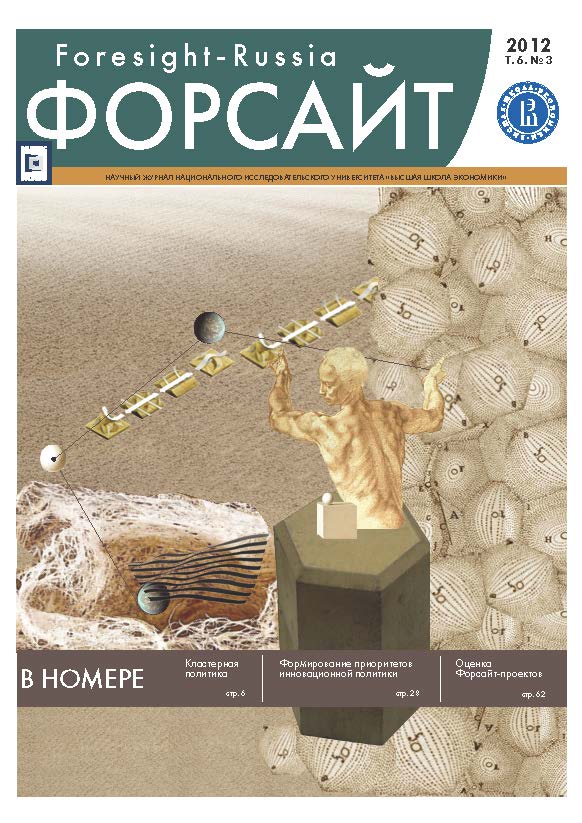Abstract
An extensive development of industrial clusters in numerous regions worldwide is determined by wide opportunities for economic growth and a series of positive ripple effects. According to international practice, developing a cluster strategy is an important step towards building a full-fledged innovation policy toolkit; moreover it gives evidence of a well thought out long-term approach by government to overall development of territories and economic sectors.
At present the Russian government has moved from conceptual frameworks to implementation of specific cluster initiatives. However using tools that have originated abroad in the Russian context requires a thorough analysis of intrinsic barriers reducing the efficiency of innovation development programmes. Direct borrowing of institutions and mechanisms from practices of leading countries rarely leads to desired outcomes. While using even advanced policy tools it is important to take into account specifics of the target environment, pay a special attention to details, not only to general frameworks and principles of incorporated institutes.
The main aim of this paper is to find and rationalize key success factors for the emerging national system of supporting regional clusters. To that end it compares the best international practices and specifics of implementing cluster policy in Russia.
References
DGCIS (2009) Competitiveness Clusters in France. General Directorate for Competitiveness, Industry and Services. http://www.industrie.gouv.fr/poles-competitivite/brochure-en.html (accessed 10 July 2012).
Dohse D., Staehler T. (2008) BioRegio, BioProfile and the Rise of the German Biotech Industry (Working Paper № 1456). Kiel, Germany. http://www.ifw-members.ifw-kiel.de/publications/bioregio-bioprofile-and-the-growth-of-the-german-biotech-industry/KWP_1456.pdf (accessed 16 August 2012).
Eickelpasch A. (2008) The Promotion of Regional Innovative Networks - Lessons from the German InnoRegio-Programme. Paper presented at the Final DISTRICT Conference «Innovation Pathways and Knowledge Economy», 16 April 2008, Brussels.
Eickelpasch A., Fritsch M. (2005) Contests for Cooperation - A New Approach in German Innovation Policy // Research Policy. № 34. P. 1269-1282.
Eickelpasch A., Kauffeld M., Pfeiffer I. (2002) The InnoRegio-Program: A new way to promote regional innovation networks - Empirical results of the complementary research. Berlin: DIW.
Etzkowitz H. (2010) The Capitalization of Knowledge: A Triple Helix of University-Industry-Government. Cheltenham: Edward Elgar.
European Commission (2002) Innovation Tomorrow. Innovation Policy and the Regulatory Framework: Making Innovation an Integral Part of the Broader Structural Agenda. Innovation Directorate EUR report № 17502. Brussels: Official Publications of the European Communities.
Karine D., Nejla B., Fanny F., Sylvain A. (2011) Agri-Food Clusters: Is French Policy in Line with Real Spatial Dynamics? Paper presented at the Special Session of AESJ2011, Tokyo. http://www-sre.wu.ac.at/ersa/ersaconfs/ersa11/e110830aFinal01848.pdf (accessed 7 August 2012).
Ketels C., Lindqvist G., Solvell E. (2006) Cluster Initiatives in Developing and Transition Economies. Stockholm: Center for Strategy and Competitiveness.
Larosse J. (2004) Towards a «Third Generation» Innovation Policy in Flanders: Policy Profile of the Flemish Innovation System. Contribution to the OECD-TIP project MONIT (Monitoring and Implementing Horizontal Innovation Policies). IWT-Observatory.
OECD (2007) Competitive Regional Clusters: National Policy Approaches. Paris: OECD.
Oxford Research (2008) Cluster Policy in Europe. A Brief Summary of Cluster Policies in 31 European Countries. Oxford Research AS.2008. http://www.clusterobservatory.eu/system/modules/com.gridnine.opencms.modules.eco/providers/getpdf.jsp?uid=100146 (accessed 2 June 2012).
Pro Inno Europe (2009) INNO-PolicyTrendChart. http://proinno.intrasoft.be/index.cfm?fuseaction=wiw.measures&page=detail&ID=8922 (accessed 26 July 2012).
Research in Germany (2011) BioRegio and BioProfile Competitions. http://research-in-germany.org/research-areas/biotechnology/2-nr-1-programmes-initiatives/42162/3-nr-6-bioregio-und-bioprofile.html (accessed 24 June 2012).
Sölvell Ö., Lindqvist G., Ketels C. (2003) The Cluster Initiative Greenbook. Stockholm: Bromma Tryck AB.
VINNOVA (2008) European Cluster Memorandum. http://www.vinnova.se/In-English/misc/Speciella_sidor/Innovation-and-Clusters/ (accessed 12 August 2012).
ВМВF (2006) InnoRegio. Bundesministerium fur Bilding und Forschung. http://www.unternehmen-region.de/en/159.php (accessed 13 July 2012).
Виньков А., Полунин Ю. (2011) Ермаки и Эдисоны // Эксперт. № 20 (754). С. 19-43.
Минэкономразвития России (2012) Проект перечня пилотных программ развития инновационных территориальных кластеров. Минэкономразвития России. http://www.economy.gov.ru/minec/activity/sections/innovations/politic/ (дата доступа 15 августа 2012 г.).
Юданов А. (2007) Гении национального бизнеса // Эксперт. №16 (557). С. 33-41.

This work is licensed under a Creative Commons Attribution 4.0 International License.

